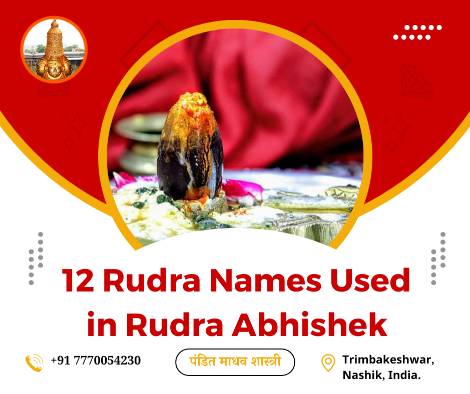
- January 1, 2025
- Pandit Madhav Shastri
- 0
12 Rudra Names Used in Rudra Abhishek – Their Deep Meaning
Rudra Abhishek Puja is a sacred Vedic ritual dedicated to Lord Shiva in his fierce form—Rudra. Performed to seek blessings for health, prosperity, protection, and liberation, this ritual involves chanting powerful mantras, including the twelve Rudra names. Each name holds a profound meaning and vibrational energy that enhances the effect of the puja. But what do these names signify? And why are they considered so important in Vedic tradition?
Let’s explore the spiritual depth behind the 12 Rudra names used in Rudra Abhishek.
1. Om Mahadevaaya Namah – The Great God
The name “Mahadeva” signifies the supreme and infinite nature of Lord Shiva. Chanting this name invokes the all-encompassing, benevolent energy that protects devotees from evil forces and helps them attain spiritual wisdom.
2. Om Rudraaya Namah – The Roarer
“Rudra” means one who roars or weeps. It represents Shiva’s fierce form that removes negativity and ignorance. This name is often associated with transformation and the destruction of evil.
3. Om Sharvaaya Namah – The Archer
“Sharva” signifies a destroyer armed with a bow. In this form, Rudra eliminates suffering and grants inner strength. This name is used to invoke protection from adversities.
4. Om Pashupataye Namah – Lord of All Beings
“Pashupati” means the Lord of all living beings. This name reflects Lord Shiva’s role as the compassionate guardian of all souls. It brings peace and harmony in relationships.
5. Om Ugraaya Namah – The Fearsome One
“Ugra” depicts the terrifying form of Rudra, who destroys ego and evil. Chanting this name builds fearlessness and helps remove inner demons such as anger, pride, and attachment.
6. Om Bheemaaya Namah – The Tremendous One
“Bheema” means mighty or formidable. This name emphasizes the cosmic power of Lord Shiva to create and dissolve the universe. It is believed to help the devotee access divine strength.
7. Om Ishanaaya Namah – The Ruler
“Ishana” refers to the ruler of the northeast direction and represents the creative aspect of Lord Shiva. This name is chanted to invoke leadership qualities, clarity, and spiritual growth.
8. Om Bhavaaya Namah – Source of Existence
“Bhava” means existence or origin. Rudra in this form is the source of life and consciousness. This name brings peace of mind and emotional stability.
9. Om Sharvaaya Namah – The Destroyer Again
This is a repetition with a subtle difference. Here, “Sharva” is seen in a more universal sense—the force that brings an end to illusions and worldly attachments.
10. Om Kapardine Namah – The One with Matted Hair
“Kapardine” symbolizes the ascetic nature of Shiva. His matted hair represents control over senses and connection with divine consciousness. This name encourages detachment and devotion.
11. Om Nilalohitaaya Namah – The Blue and Red One
“Nilalohita” represents Shiva’s dual nature—calm and fiery. The blue hue symbolizes the cosmic ether, while red represents fire. This name balances serenity with intensity.
12. Om Sadashivaaya Namah – The Eternal Shiva
“Sadashiva” means the ever-auspicious and eternal form of Lord Shiva. Chanting this name helps the devotee connect with pure consciousness and eternal bliss.
Significance of Chanting These 12 Names During Rudra Abhishek
Each of the 12 names represents a unique divine quality of Lord Shiva. When chanted during the Rudra Abhishek Puja, these names:
Purify the mind and soul
Remove negative energies and planetary doshas
Heal physical and emotional issues
Bring material and spiritual abundance
Invite divine protection and guidance
FAQ: Frequently Asked Questions
Q1: Can I chant the 12 Rudra names daily at home? Yes. Regular chanting, especially during the early morning or evening hours, can bring calmness, clarity, and spiritual upliftment.
Q2: Is there a specific time or day to chant these names? Mondays and the month of Shravan are considered especially auspicious for chanting Rudra’s names. However, you can chant them daily.
Q3: Do I need a Pandit for Rudra Abhishek Puja? While a learned Pandit is ideal for a full Vedic Rudra Abhishek, you can still do a simplified version at home with devotion.
Q4: How many times should each name be chanted? Traditionally, 108 repetitions of each name are done using a Rudraksha mala. However, even a few sincere chants bring blessings.
Q5: What are the benefits of chanting Rudra’s names during a dosha period? It helps pacify malefic effects of planets, removes karmic blockages, and brings mental strength and focus.
Conclusion: Connect With Rudra’s Essence
The 12 Rudra names are not just titles; they are powerful frequencies that represent the multidimensional nature of Lord Shiva. When used in Rudra Abhishek Puja, these names have the power to transform the seeker’s inner and outer life. Whether you’re facing challenges in health, relationships, career, or spirituality—invoking these sacred names can be a gateway to divine grace.
Embrace them with devotion and faith, and experience the mystical energy of Rudra in your life.
